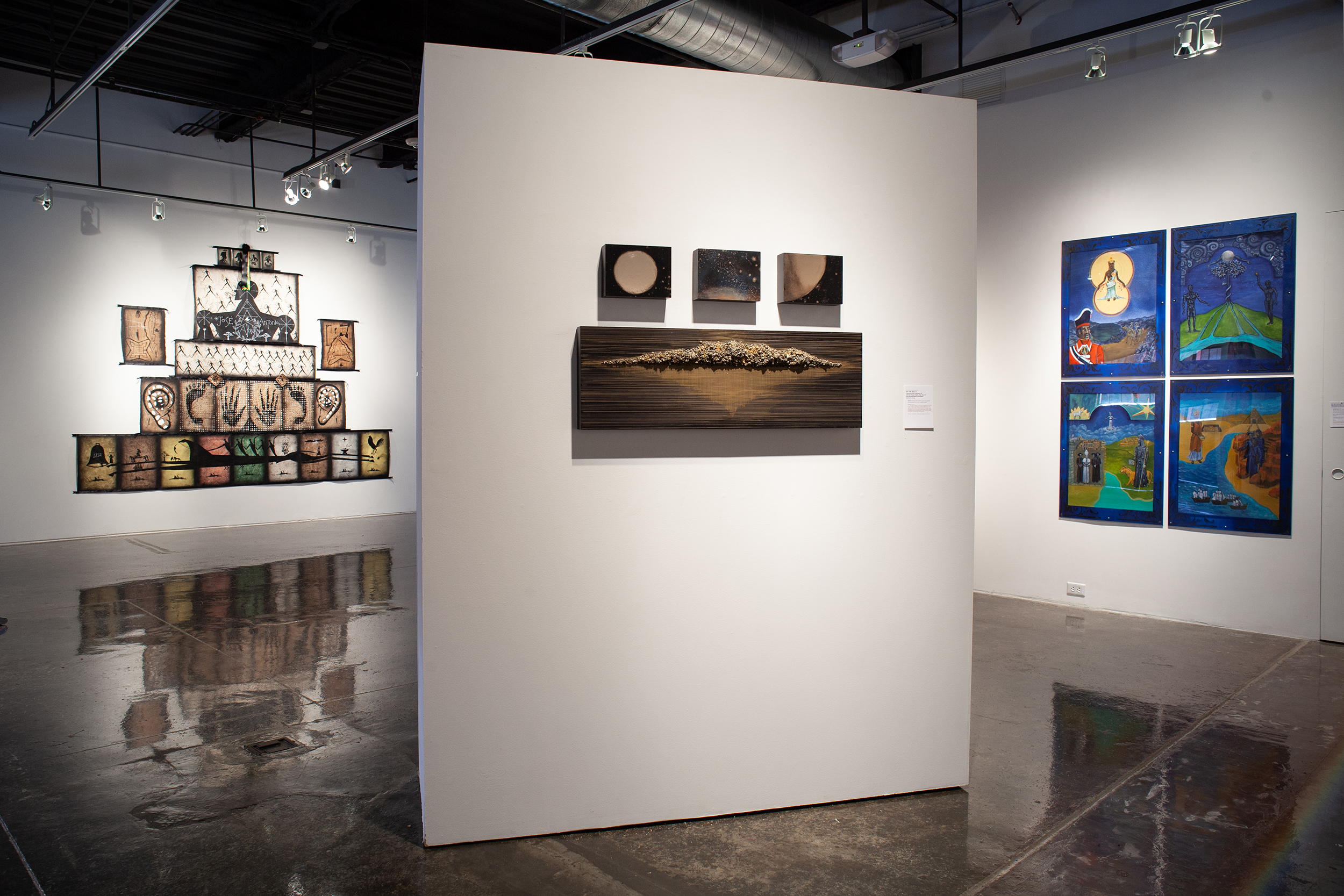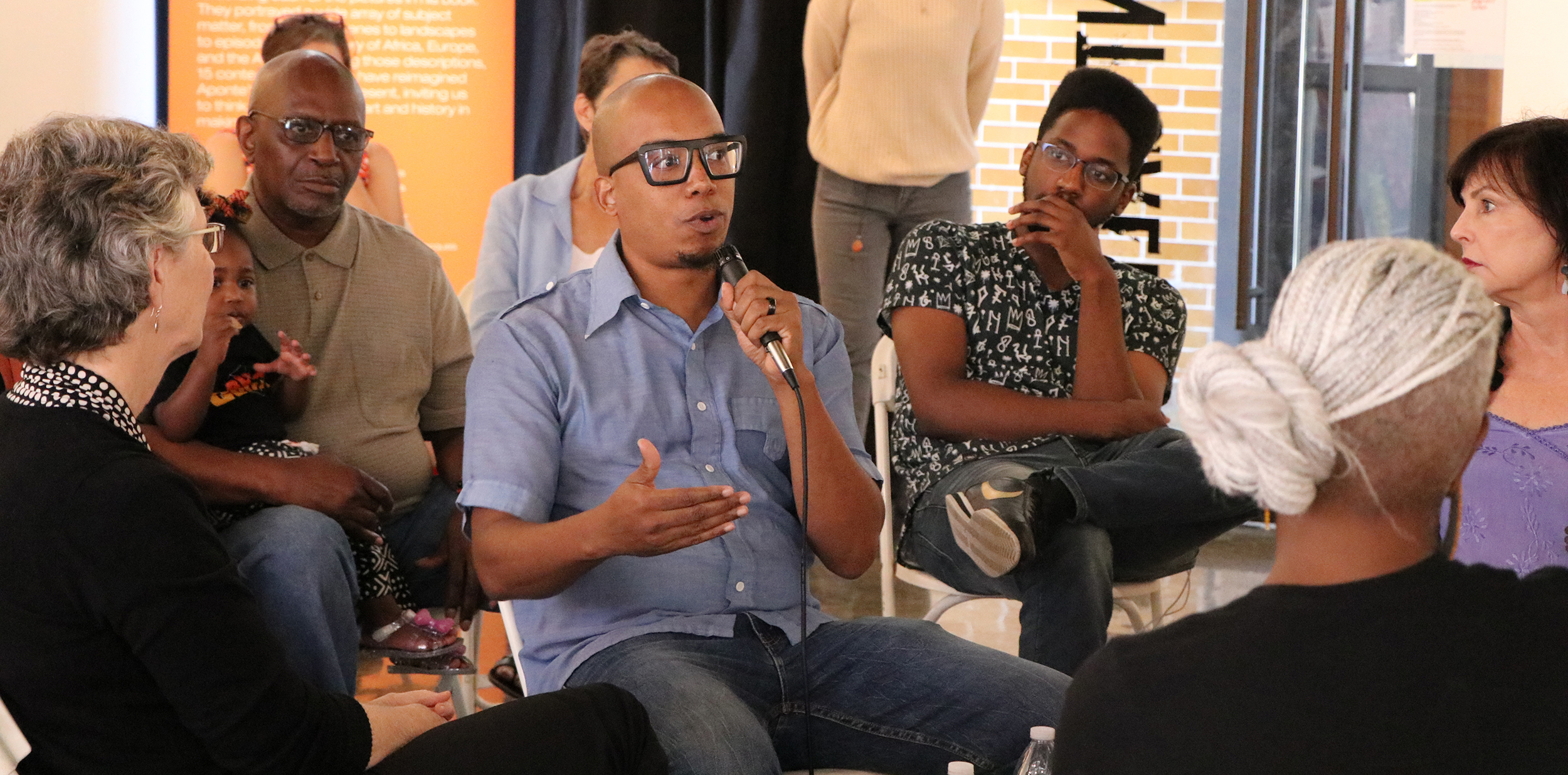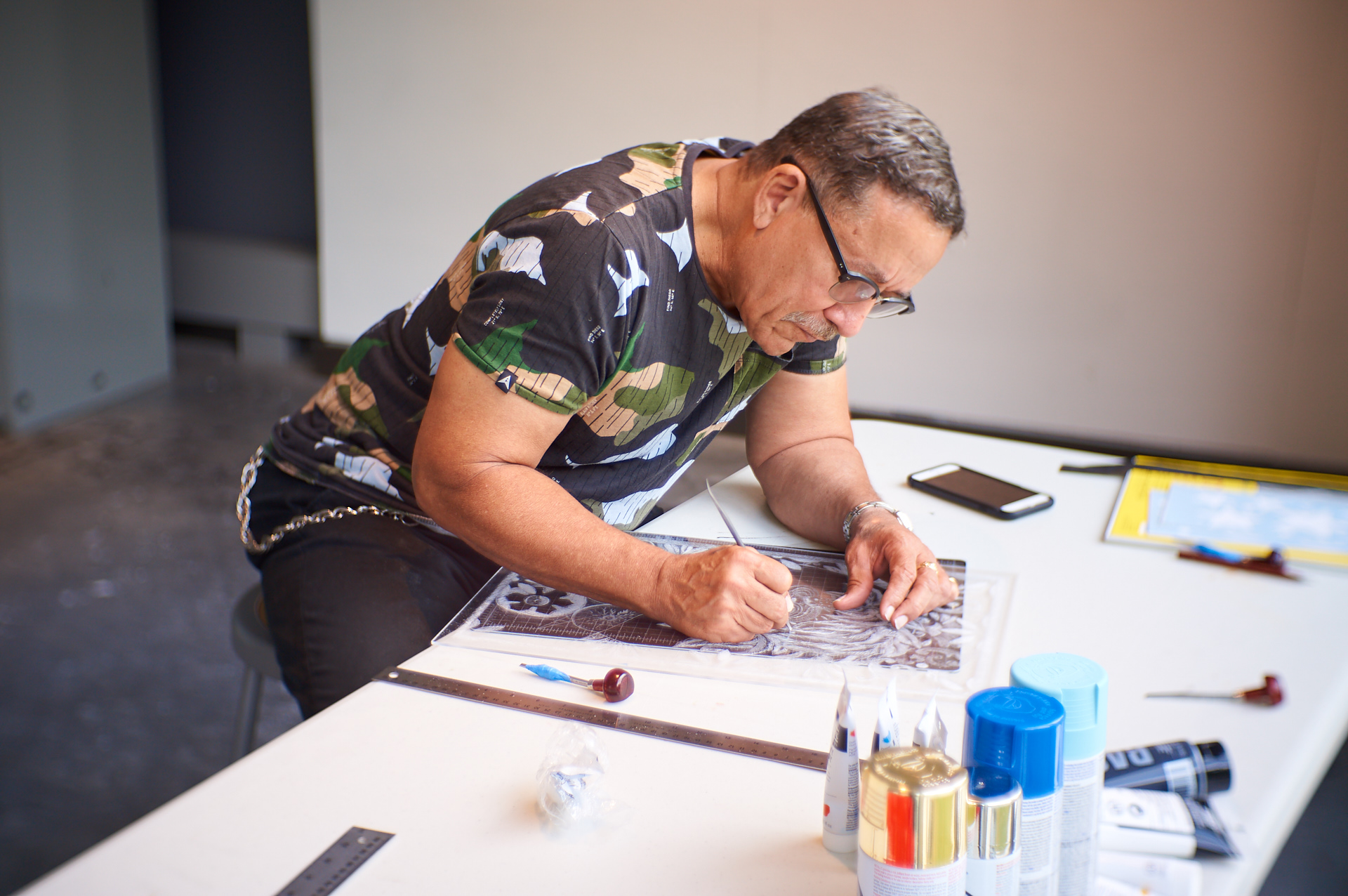Visionary Aponte: Art & Black Freedom
October 12, 2018
The Visionary Aponte: Art & Black Freedom art exhibit takes as its point of departure an extraordinary — and now lost — historical artifact: a “Book of Paintings” created by José Antonio Aponte.
By Forum staff

Exhibition pieces by José Bedia (left), Teresita Fernández (center), and Édouard Duval-Carrié (right). Visionary Aponte: Art & Black Freedom will be on view at the Power Plant Gallery from September 19 - November 17, 2018. PHOTO © HOANG NGUYEN, MFAEDA20G
After months of preparation, the Forum for Scholars and Publics and the Power Plant Gallery are pleased to present the exhibit Visionary Aponte: Art & Black Freedom and its related event series.
José Antonio Aponte was a free Black carpenter, artist, and former soldier who was also the leader of an ambitious antislavery movement in Cuba during the Age of Revolution. During his trial, Aponte was forced to provide testimony describing each of the pictures in his book, which portrayed a wide array of subjects, including Biblical stories and verdant landscapes, Roman goddesses and Spanish kings, and Black men as warriors, emperors, and librarians.
I am very excited about the micro-conversations that this exhibition inspires. These conversations might take their cue from Aponte's story, or the artwork, but they are not limited by either. — Caitlin Margaret Kelly
Using those descriptions and building on research by NYU historian Ada Ferrer into Aponte’s trial, fifteen contemporary artists working in painting, drawing, sculpture, video, mixed media, and textile have reimagined Aponte’s book. The original exhibit, which debuted at the Little Haiti Cultural Center in Miami in December 2017 and has also been displayed at New York University, was curated by Ferrer and Haitian-born artist Édouard Duval-Carrié. The Forum’s faculty director Laurent Dubois and Power Plant Gallery director Caitlin Margaret Kelly have collaborated with them for the Duke edition.
Dance, Song, and Spoken Word Open the Exhibit
The opening celebration took place on September 19, 2018, and featured an Afro-Cuban-inspired procession and dance created by Caribbean choreographer/dancer and scholar Yanique Hume and the Duke Dance Program's Andrea E. Woods Valdés.
Valdés was excited about the creative possibilities surrounding the Visionary Aponte exhibit. “It has at its roots Afro-Cuban culture and history, scholarship, interdisciplinary work, and for the dance and procession, community collaboration," she said. "The possibilities of relating the original Aponte themes to a contemporary context will be powerful and moving, especially during a time when many artists seek to create works that unite rather than divide humanity.”
Her dance group, Calabasa Calabasa: Dancing and Making the Music of Life, brought dancing and singing to the opening event and helped lead spectators into the gallery space.
Hume's opening procession, entitled Passages & Aperturas, drew members of the large crowd gathered inside the Boiler Room at American Tobacco Campus into the performance itself. "This piece," she explained, "explores the act and process of moving through time and space — traversing locations and possibilities, eventually arriving at the potentiality of freedom, and realizing that it's not always realized."
Hume's choreographies draw on her years of training in Haitian dance and her intimate knowledge of the ritual and popular dances from her native Jamaica and Cuba. Her own sacred/initiatory journey crosses several religious systems, including Bantu-Kongo and Yoruba-based practices, and they came together in her opening-night performance.
To mark the occasion, Dr. Joan Francisco Valdés Santos composed the poem En blanco y negro vengo a rescatarte, which he and Hume recited in Spanish and English, respectively.
Local Communities Draw Inspiration From the Exhibition
In the coming weeks, several large groups of high school students will visit the gallery, learn about the Aponte project, and seek inspiration for creating their own works of art. Students at the Durham School of the Arts, for example, will take the month of October to create a zine based on their discoveries in the gallery and about Aponte himself.
"I am very excited about the micro-conversations that this exhibition inspires," says Kelly. "These conversations might take their cue from Aponte’s story, or the artwork, but they are not limited by either. And certainly they are no less important. Our program of events strives to create many access points, and that means considering how these works might influence our physical bodies, via dance, or walking around the gallery, or via conversations about Black freedom, or films on Afrofuturism."

Against the backdrop of Visionary Aponte: Art & Black Freedom, puppeteer Tarish Pipkins (pictured above, speaking) joined SisterSong activist Omisade Burney-Scott, The Jumpsuit Project's Sherrill Roland, Duke Law's Theresa Newman, and Lynden Harris of Hidden Voices in a frank discussion about wrongful incarceration and fighting systemic racism. PHOTO © DUKE FORUM
"The amazing thing about Aponte’s book was that he was making art in the process of trying to change history, to change the world," says Laurent Dubois, Professor of History and Romance Studies at Duke. "He was interested in overthrowing slavery, maybe creating an independent Cuba. The art was part of that imagining of a different future."
Dubois sees the larger Visionary Aponte project as one that has the potential to make connections, both across contemporary boundaries and between past and present. “There are not a lot of Caribbean or Afro-Atlantic artists from the early nineteenth century whose work we can connect with in a direct way. A lot of work in this exhibit is fundamentally about reaching a hand back or forward – Aponte reaching out from his period and us reaching back to him, making a connection and understanding the kind of ongoing struggles that artists and their communities are still facing.”
Kelly concurs: "The intersection of this particular part of Cuban history with our own political and social climate is important. As an artist, Aponte used images of Black kings, emperors, and other historical figures from the past to imagine a future for himself and those like him. The artists in this exhibit continue that work by imagining Aponte’s vision of the future, and also their own. Through this exhibition, Duke and Durham communities have a chance to experience those visions, and hopefully also create their own spaces for imagining futures.
Artists in Residence Create New Works
Towards our goal of honoring Aponte’s aspirations and extending the collaborative spirit of the Visionary Aponte: Art & Black Freedom exhibit, we and our partners have developed multiple avenues for interacting with the exhibit and its themes. These include an Afrofuturist film series, artists’ residencies at the Rubenstein Arts Center, artist talks and tours at the Power Plant Gallery, dance performances, and panel discussions. You can find the full schedule of events at aponte.dukefsp.org.
Duval-Carrié, in residence at the Rubenstein Arts Center from September 15 to November 15, will create a new piece to add to his works already on display in the exhibit. Haitian visual artist Tessa Mars will likewise create and reveal a new piece while in residence at the Ruby from October 1 - 16, 2018. Jean-Marcel St. Jacques, whose Portal for Aponte stands out as a central feature of the exhibit, will be in residence at Duke in early November and will engage with local students and members of the African American Quilt Circle of Durham to create a new piece inspired by Mardi Gras in New Orleans.

Visionary Aponte artist-in-residence Édouard Duval-Carrié at work in the Rubenstein Arts Center at Duke University. PHOTO © ROBERT ZIMMERMAN
We hope the Durham iteration of the Visionary Aponte: Art & Black Freedom exhibit and event series will prove to be a generative experience for those who have experienced it. Says Kelly: "What I hope people take away is a memory that is not so easily forgotten. I hope each person has a personal moment with a piece in the exhibit, or idea that is generated, or a feeling that is triggered. I hope they learn something about Aponte, about Cuba, about each of the artists in the exhibit, about this history, this place, and our present."
Visionary Aponte: Art & Black Freedom is a nine-week art exhibit and accompanying series of conversations, screenings, performances, residencies, and workshops at Duke University organized by the Power Plant Gallery and the Forum for Scholars and Publics. Based on a digital humanities project called Digital Aponte, the exhibit is curated by Édouard Duval-Carrié and Ada Ferrer and funded in part by the Center for Latin American and Caribbean Studies at NYU, the King Juan Carlos I of Spain Center at NYU, the Haitian Cultural Arts Alliance, and the John S. and James L. Knight Foundation. The accompanying events have been made possible with support from the following campus and community partners: the Center for Documentary Studies, the MFA in Experimental and Documentary Arts, The Office of the Vice Provost for the Arts — Duke Arts, the Rubenstein Arts Center, Arts of the Moving Image, Screen/Society, the John Hope Franklin Humanities Institute, the Duke Dance Program, the Duke Center for Latin American and Caribbean Studies, Art, Art History & Visual Studies, the Program in Literature, the Department of Cultural Anthropology, the Department of African & African American Studies, Duke Gender, Sexuality & Feminist Studies, Duke Performances, Duke Coffeehouse, Duke Service-Learning, and Calabasa Calabasa: Dancing and Making the Music of Life. Visit the Visionary Aponte website at aponte.dukefsp.org.
check us out
on social media